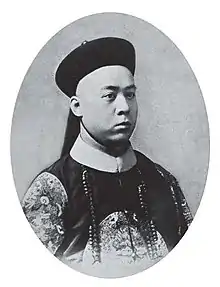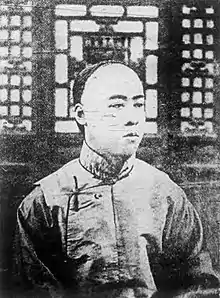Puwei
Puwei (Chinese:溥偉; pinyin:Pú wěi; 30 December 1880 – 10 October 1936), courtesty name Shaoyuan, was a Manchu prince and statesman of the late Qing dynasty. He was a member of the Prince Gong peerage, and held the title from 1898 until his death.[1]
| Puwei | |||||||||
|---|---|---|---|---|---|---|---|---|---|
| Prince Gong of the First Rank | |||||||||
 | |||||||||
| Tenure | 1898 – 10 October 1936 | ||||||||
| Predecessor | Yixin | ||||||||
| Successor | Yuzhan | ||||||||
| Born | 30 December 1880 Beijing, Qing China | ||||||||
| Died | 10 October 1936 Xinjing, Manchukuo | ||||||||
| Issue | Yuzhan | ||||||||
| |||||||||
| House | Aisin-Gioro | ||||||||
| Father | Zaicheng | ||||||||
| Mother | 赫舍里氏 | ||||||||
Life
Life during the Qing dynasty
He was a part of the House of Aisin-Gioro. Puwei's biological father was Zaiying, the second son of Yixin. Since Yixin's eldest son Zaicheng died without an heir, Puwei was adopted as Zaicheng's son by the Empress Dowager Cixi's decree. After the death of Zaicheng, Puwei assumed the title of prince and became the second generation Prince Gong. Puwei was also appointed as the minister of anti-smoking. During the 1911 Revolution, he organized the Royalist Party with Shanqi and others in an attempt to restore the Qing Dynasty, and he refused to sign the abdication edict. It is rumored he said "As long as I'm here, we will fight. The Qing Empire will never perish".[1]
Life after the Qing dynasty
After the Qing dynasty fell, Puwei bought a house on the seaside of Qingdao and brought all his family members from Beijing. When the Japanese army captured Qingdao in 1914, his house, that was built along the sea was naturally exposed to the naval gunfire. One night, after his residence had been shelled several times, Puwei and his family hurried to a friend's house. He took refuge in his residence, but before he could move in, it was shelled too and an entire wall of a room was destroyed. Even in this situation, Puwei still tried to remake the disbanded Zongshe Party, and secretly organized armed forces in the Liaodong area in a desperate attempt to restore the Qing dynasty.
In 1922, China took back the sovereignty of Qingdao from the Japanese. Puwei, who was determined to restore the Qing, left Qingdao after living there for 10 years and went to Dalian, which was under Japanese rule at the time. Before leaving, he gave some of the furniture to Kang Youwei. After experiencing these futile intrigues, Pu Wei became increasingly frustrated. At this time, he also began to realize the difficulty of life financially.
Puwei was immature when it came to employing people. The person that was responsible for managing his property took a lot of money from him. He originally owned thousands of acres of fertile land, and every year the land rent could fully guarantee his royal life, but as the years passed, the person took the money from selling a large area of land and kept the money for himself. He also smuggled out a large number of books and antiques from the Forbidden City. Later, in order to cover up such a large-scale theft, a eunuch set fire to the Forbidden City. Puwei, who became increasingly financially unable, even had to abandon his two-horse glass-covered carriage. After moving north to Dalian, his life became more difficult, and political frustration made his health deteriorate. In October 1936, in a hotel in Changchun, the 56-year-old last Prince Gong passed away due to poverty and illness.[2]
Claim to the throne
Puwei is the direct grandson of the first generation Prince Gong, Yixin. Yixin's eldest son Zaicheng was supposed to inherit the throne of Prince Gong, but Zaicheng died early. Since Puwei was Zaicheng's adopted son, he had a claim to the throne.[1] After the Mukden Incident, Japan occupied Manchuria and contacted Puyi to establish a puppet regime. Puyi hesitated and did not agree immediately. Japan then asked Puwei to become Emperor. After hearing the news, Puyi left Tianjin and hurriedly took a boat to Lushun, but the Japanese still felt that Puyi's reputation was greater, so they established the puppet Manchukuo with Puyi as the Chief Executive, and Puwei lost another opportunity to proclaim himself emperor.
Family

Mother and father
Mother: 赫舍里氏
Adoptive father: Zaicheng, the eldest son of Yixin, posthumously named Prince Gongguomin.
Biological father: Zaiying, who was given the title of Beile.
Concubines and wives
Wife: 嫡福晉碧魯氏
1st concubine: 側福晉賈佳氏
2nd concubine: Zhang
3rd concubine Zhou
Sons
1st son: Unnamed, deceased.
2nd son: Yu Lao, born in 1905, passed away.
3rd son: Yu Ke, born in 1906, passed away.
4th son: Yu Song, born in 1907, passed away.
5th son: Yu Xi, born in 1909, passed away.
6th son: Unnamed, deceased.
7th son: Yu Zhan, Prince Gong (1923-2016)
8th son: Yu Si, born in 1926, passed away.
9th son: Unnamed, passed away.
10th son: Yu Rong, born in 1930, passed away.
11th son: Yu Wei, born in 1932, passed away.
Daughter
1st daughter: Yunxia (1934-)
References
- "溥伟:被误读的纨绔子弟-书摘-光明网". epaper.gmw.cn. Retrieved 2023-10-18.
- "恭亲王傅伟客居青岛十年 两次欲"称帝"皆梦碎|半岛网". news.bandao.cn. Retrieved 2023-10-18.